As a family law attorney here in Texas, I’ve seen relief on my clients faces the day the divorce is finalized. But when there are kids involved, I’ve also seen the grief return when disputes over custody matters and visitation reappear in their lives. This can be the case even when there is a clear parenting agreement in place. Rex came calling when his ex started making excuses about why their son couldn’t come visit him despite their legal binding arrangement.

“Chris, it’s as if I’m still glued to her. It’s the same accusations, the same lies, the same nonsense as when we were married, now it’s just about Walker coming to see me,” Rex explained.
“Tell me more Chris, what’s going on, is she not allowing Walker to come visit you as planned?” I asked.
“Yes, that’s exactly it. She makes excuses like he’s got too much homework or wants to sleepover at a friend’s house,” Rex said. “I mean I only have him every other weekend. I gave her everything else she asked for, I just wanted to see my kid a few weekends a month before he grows up. He’s 12 already.”
“How long has this been going on Rex? I need some more detail,” I responded.
“She eased into not following the arrangement right after the divorce two years ago. I was cool with it at first. But when one night instead of two, became whole weekends, and then once every few months became nearly an every month issue, I confronted her on it. She attacked back telling me that I’m irresponsible, I drink too much, and my anger is out of control. Really she’s describing herself,” Rex explained. “I think it’s gotten worse ever since I started seeing my new lady. I think she doesn’t want Walker knowing I found somebody else before she did.”
“Could be Rex, new significant others can throw a wrench into post divorce child custody arrangements,” I told him. “Please let me go over some information about denying visitation. I think it’ll help you understand your legal rights.”
Child custody arrangements involving visitation like Rex’s are often tough to handle. They can even feel unfair, but when can visitation be denied to the non-custodial parent? This is a heavy question, and many parents struggle with it during difficult times.
In Texas, the law focuses on what’s best for the child. In this article, we’ll explore when can you deny visitation to the non custodial parent, but understand, the situation can get complicated fast. Since Texas courts emphasize maintaining a healthy bond with both parents when it’s possible, working on co-parenting strategies can help ensure the best interests of the child
Understanding Visitation Rights in Texas
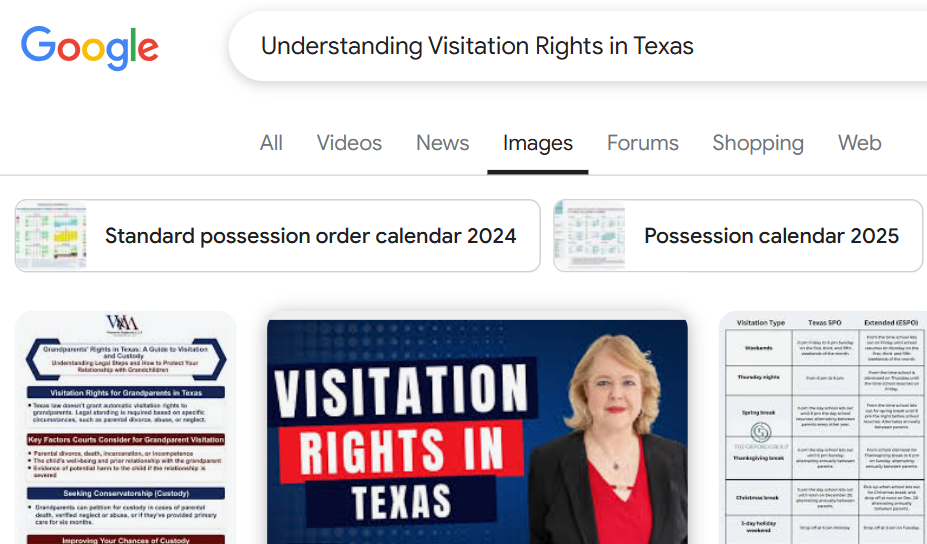
Visitation rights let a non-custodial parent see and spend time with their child. These rights are important because children usually benefit from having both parents in their lives. A formal visitation agreement often outlines specific days and times for visitation, which helps reduce conflicts.
In Texas, the parent who takes care of the child most of the time is called the “custodial parent.” The other parent is the “non-custodial parent.” Even if a parent does not have primary physical custody, non-custodial parents often have visitation rights ordered by a family court. These rights are vital to any custody arrangement because they ensure both parents stay involved in the child’s life, unless there is a valid reason to limit or deny visits.
The Legal Framework in Texas
Texas family law supports the child’s best interests, including regular, meaningful time with both parents. The Texas Family Code lays out the standard possession order. When disputes come up, a child custody lawyer can guide you on legal details and help protect the custody of the child.
Court orders dictate the visitation schedule. These binding documents list the days, times, and special conditions of the parenting time. If disagreements grow serious, a family law attorney can clarify the terms.
When Can You Deny Visitation to the Non Custodial Parent?
Denying visitation is a big decision. To deny child visitation, you need a valid reason with legal grounds. The main goal for a custodial parent is to protect the child’s physical and emotional well-being. Courts check to determine if the refusal is in the child’s best interests before allowing it to be denied.
Family courts take visitation rights seriously. Minor disagreements or small problems are usually not enough to stop visitation. If you’re unsure about having a valid reason to deny visits, talk to a child custody lawyer. They can help you keep or change custody of the child according to the law.
Serious Safety Concerns
The biggest exception to most court orders is when a real threat appears. If a child’s safety or well-being is in immediate danger, a parent might legally withhold the child. Such threats can involve emotional abuse, severe neglect, or other harmful acts.
If a non-custodial parent shows signs of abuse, parental alienation, or direct threats, the other parent should act quickly. Violence or neglect also fall under this category. In extreme cases, going for sole custody could be necessary if the child is at ongoing risk.
Substance Abuse and Domestic Violence

Source: 2015childwelfare.pdf
When the non-custodial parent has a history of substance abuse or domestic violence, it can be a valid reason to deny visitation rights. Here’s what you need to know:
- Proof Matters: Courts need solid proof of these behaviors to take action.
- Quick Decisions: If there is clear evidence, a judge might quickly suspend or remove visitation rights to protect the child.
- Supervised Visitation: Sometimes, the court might allow visits but only under supervision to keep the child safe.
Example Case (Hypothetical Scenario):
- A mother provides police reports and medical records showing the father’s repeated domestic violence.
- The judge may decide that the father’s visitation rights are too risky.
- The mother could be given temporary sole custody until the father completes a rehab program or meets other court-ordered conditions.
This approach ensures the child’s safety and can have a big impact on the custody case outcome.
Abduction Risk
If there is a strong reason to think a non-custodial parent might kidnap the child or leave the state or country, it becomes easier to justify withholding visitation. Past behavior can reveal a pattern. A professional assessment might be needed to fully evaluate the threat. Working with a family law attorney can help you gather proof.
Court-Ordered Modifications
If you want to deny visitation for a long time or change the visitation agreement, you need a new court order. A judge will decide how to handle this, even for short-term changes. Texas law requires that you go through this process. A child custody lawyer can help you gather evidence and present it in court. Working with experienced family law attorneys gives you the expertise needed to navigate these complex situations.
A skilled attorney can guide your custody case. They can request temporary restraining orders and fight for your child’s interests while handling issues like:
- Parental alienation
- Emotional abuse
- Serious safety concerns
They verify proof and make sure the legal steps are correct.
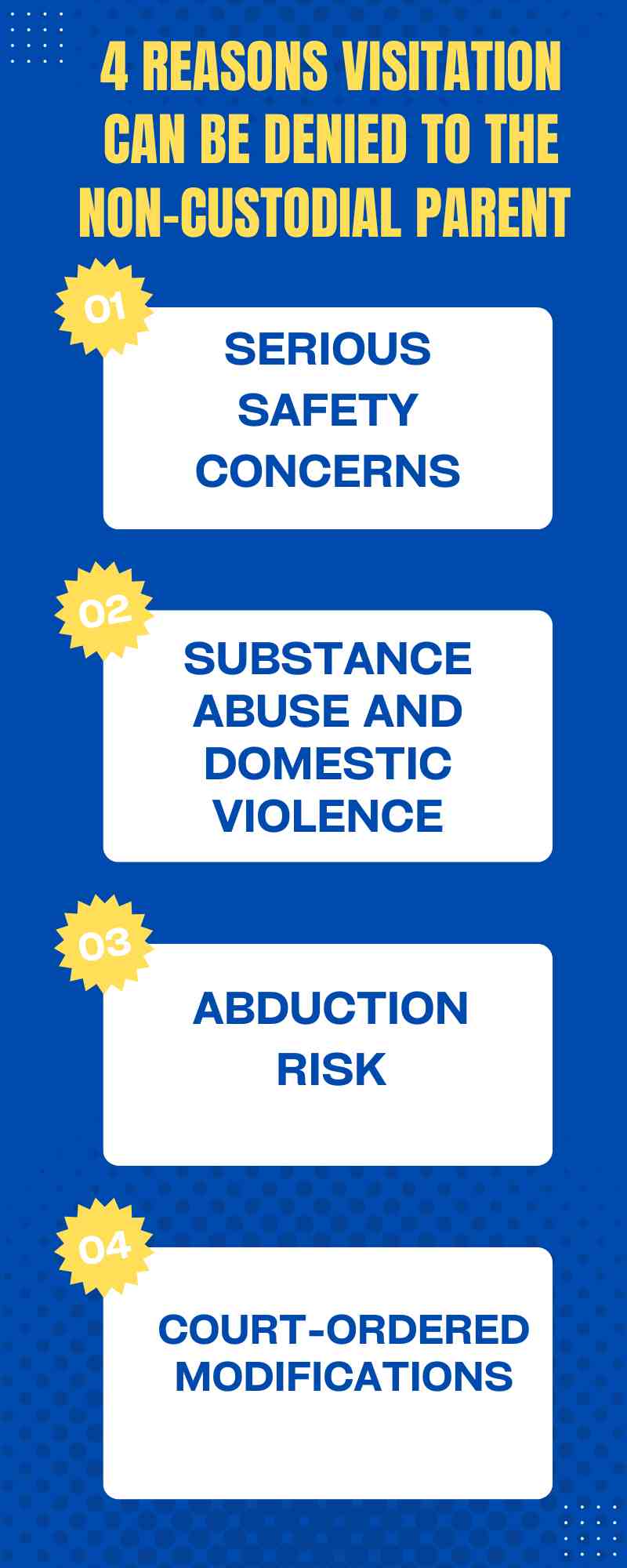
Consequences of Wrongful Denial of Visitation
Parents refusing visitation without legal grounds can bring serious penalties like contempt of court. Doing things by the book is important, or the parent might lose custodial rights. Courts take these orders seriously, and contempt of court can follow repeated violations of a visitation agreement.
If wrongful denials keep happening, jail time could become an option, along with money penalties. Trying to block access to force changes in child support payments or for other non-safety reasons is never wise and is not in the child’s best interest.
How To Properly Handle a Denial
If you face a possible denial of visitation, gather all the facts right away. Seek legal advice to protect the child and ensure any legal move is backed by proof. A solid record of incidents helps the court see if refusal truly matches the best interests of the child.
Texts, emails, photos, and witness testimonies can show child endangerment or back up a temporary stop of visits. If you are the parent who is denied visits, make a record of any wrongful denial. This can support your motion for enforcement in court.
Below is a table outlining common issues and possible evidence.
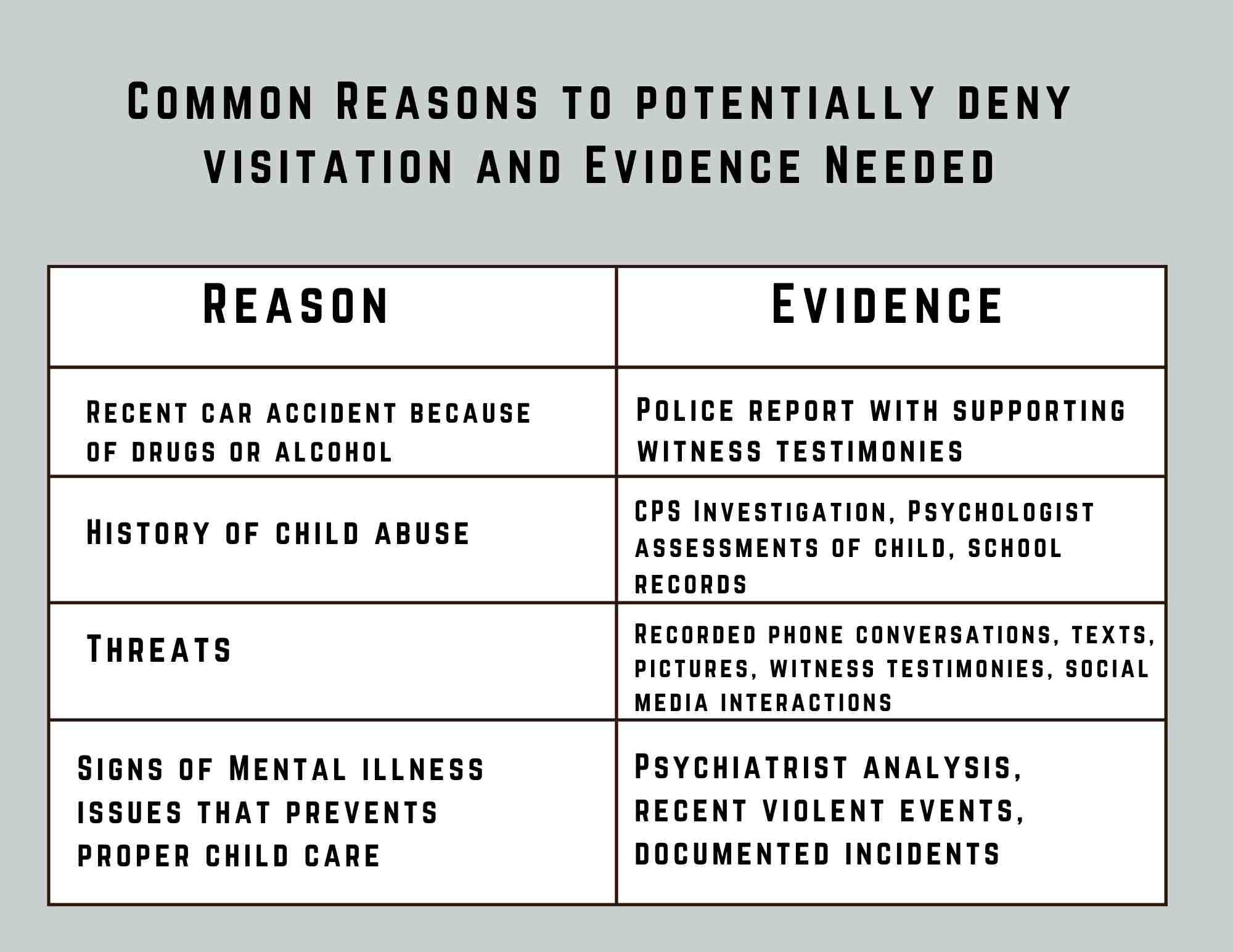
This list is not complete, but it shows what can be collected to keep the child safe.
Restraining Order
If a parent believes their child’s safety is at risk, an immediate temporary restraining order may be needed. Legal advice is important, because a wrong move can make custody of a child more complicated. A restraining order offers quick legal protection to ensure everyone’s physical safety.
After a restraining order is granted, a family court will hold a hearing where the non-custodial parent can contest the new restrictions. These actions often arise in serious cases of emotional abuse, kidnapping threats, or violence.
Frequently Asked Questions
Denying Visitation
When can you deny visitation to the non custodial parent in Texas?
Denying visitation is only allowed under strict legal reasons, like immediate danger or major neglect. If you think the child is in danger, you can hold back visits for a short time, but you should get a court order as soon as possible. Texas courts usually prefer steady contact with both parents unless the custody arrangement allows for serious harm.
Can one parent refuse the other parent’s visitation rights?
Either parent can refuse visitation only if there is proof of risk to the child’s safety or well-being. This can include abuse, untreated substance misuse, or credible threats. Refusing visits without a valid legal reason can lead to contempt of court or changes in the custody of the child.
Can you refuse visitation without a court order?
Refusing visitation without a court order is risky and often goes against existing custody arrangements. If you fear for the child’s safety, you can take quick protective steps, but you must ask for a court modification right away. Acting alone can risk your custodial rights or harm future co-parenting.
Is it legal to withhold visitation from a parent if there is no custody agreement?
Even if there is no formal custody order, withholding a child from the other parent can create legal problems. Courts prefer children to have steady contact with both parents unless there is a clear danger. Getting an official order that clarifies custody of a child is safer than denying visits on your own.
Does no visitation mean no contact?
“No visitation” usually means no in-person time. It can also include banning phone or digital contact if there is proof that those interactions pose ongoing emotional harm. If you need total no-contact, ask the court for a clear ruling.
Child’s Preferences and Communication
What if my child doesn’t want to see the other parent?
A child’s wishes can matter in court, but they are not the only factor. If your child is afraid or uncomfortable due to mistreatment, write down their concerns. Then consult a child custody lawyer, and if there is proof of emotional abuse or safety issues, request a court-ordered change to protect the child’s well-being.
What age can a child in Texas decide which parent to live with?
In Texas, once a child is 12, a judge may consider that child’s preferences. But there is no guaranteed “decision age.” The court looks at all facts and rules based on the best interests of the child, even if the child states a preference.
Legal Consequences and Processes
What happens if you violate your custody order?
If you break a custody or visitation order, you could face contempt of court, fines, or even jail time if it happens repeatedly. Judges expect both parents to follow approved schedules and may punish those who ignore them. If you have real safety concerns, it’s better to file a motion to modify the order than to risk legal troubles.
How can a non-custodial parent lose visitation rights or have them taken away?
A court can limit or end a non-custodial parent’s child visitation rights if there is credible proof the child is in danger, such as ongoing abuse or repeated violations of a custody order. You must submit evidence of risk and ask the court to change or stop visits. If granted, the new order explains any restricted or canceled access.
How do I terminate the other parent’s rights in Texas?
Terminating a parent’s rights is permanent and goes beyond changing visitation. It usually requires proving severe issues like abandonment or chronic neglect that put the child’s well-being at risk. Because the impact is so big, the court asks for solid evidence. It’s best to work with a child custody lawyer if you plan to terminate someone’s rights.
Child Support
Can I deny visitation if the other parent is behind on child support?
In Texas, visitation and the duty to pay child support are two separate legal duties. You generally cannot refuse court-ordered visitation just because the other parent is late with payments. If they are not paying child support, you should ask the court for enforcement or a change, rather than block their visits.
What expenses are covered by child support?
Child support normally covers basic needs like food, shelter, and clothing, along with health care and school expenses. It can also include extracurricular activities if the court order says so. But costs outside the official support agreement usually are not covered.
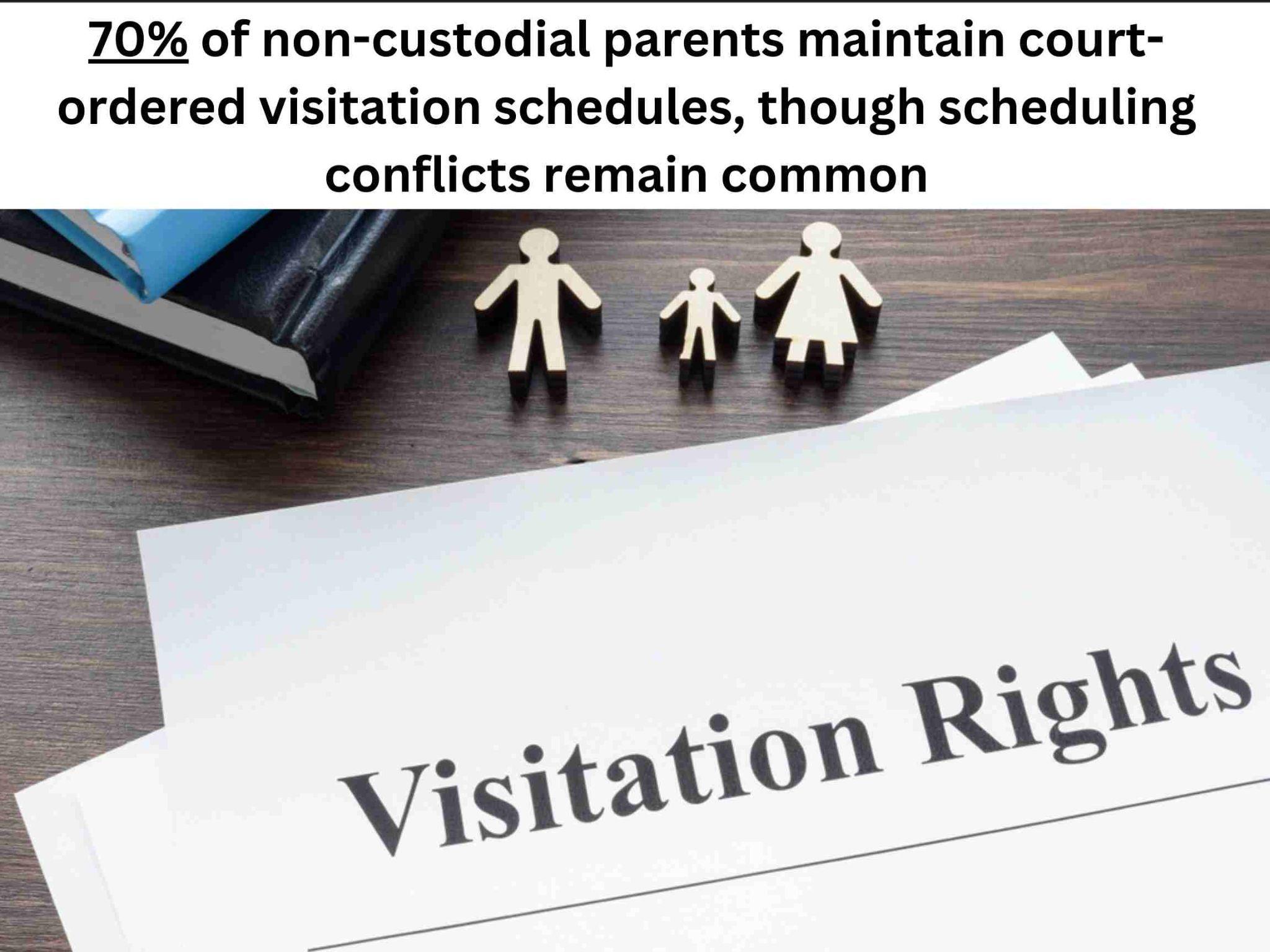 Source: Family Law Statistics and Divorce Trends to Know in [2025]
Source: Family Law Statistics and Divorce Trends to Know in [2025]
Conclusion
Figuring out custody arrangements and dealing with disputes over child visitation rights means you need to understand your legal boundaries. Following the court’s rules helps you avoid serious consequences that come from wrongful visitation denials. Although it can be frustrating, focusing on the best interests of the child is often the best way to resolve problems involving the other parent.
Keep track of valid evidence supporting your claim that visits should be limited or denied. A parent must have strong proof of a valid reason before withholding time from the non-custodial parent.
Finally, getting help from an experienced child custody lawyer is vital for complicated custody cases. A law firm can guide you on co-parenting plans, getting sole custody if needed, and managing child support payments. By staying informed and following legal procedures, you can protect your child’s well-being and prevent harmful legal outcomes.
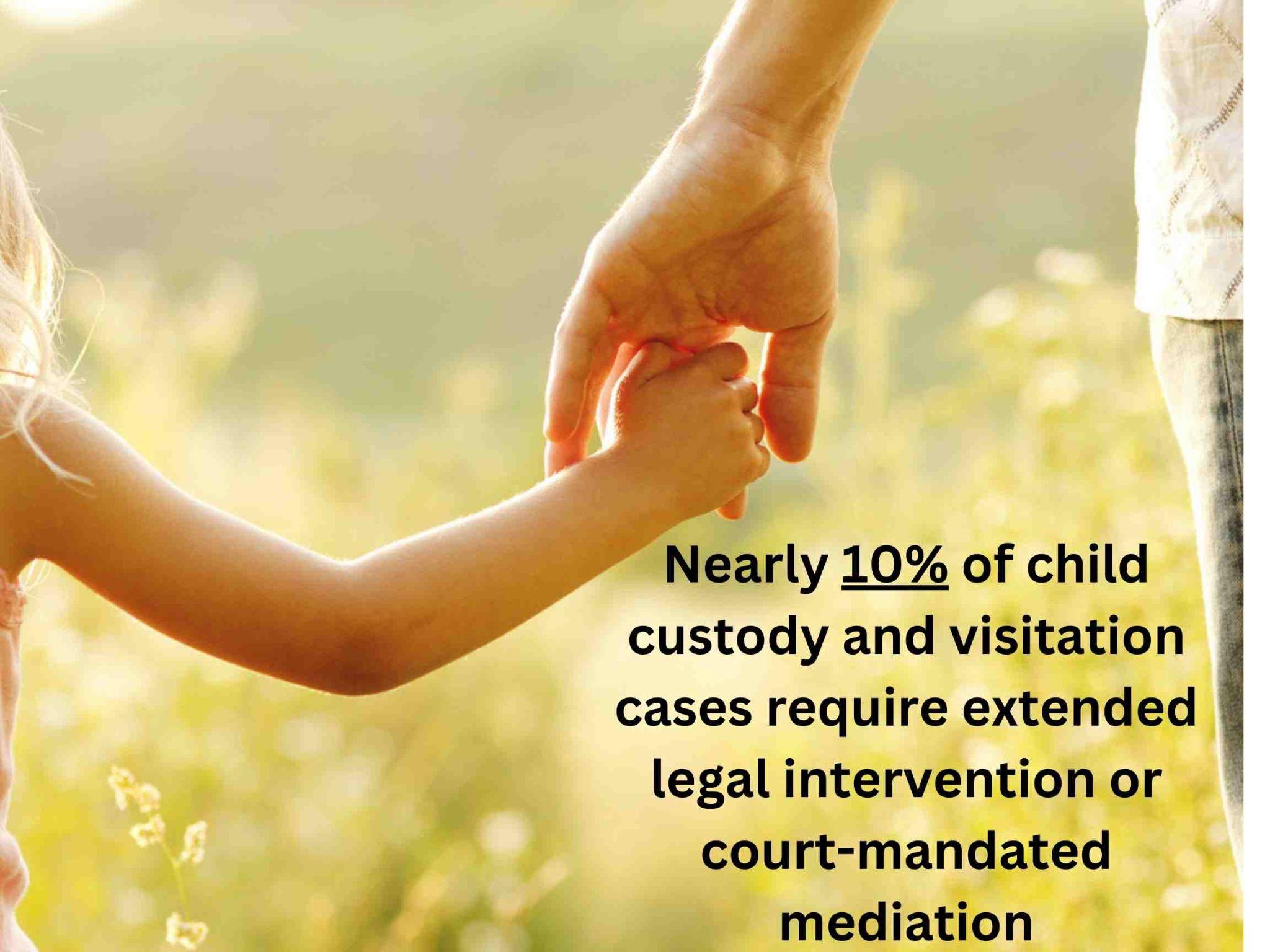
Source: Family Law Statistics and Divorce Trends to Know in [2025]
What is Rex’s Plan?
“Chris, it seems the law is on my side here. What can we do about it?” he asked.
“Rex, let’s first address those accusations of hers. If she really thinks you might be a danger to Walker she might have a case if she goes through the proper legal channels to change the arrangement. Is any of it true at all?” I asked him.
“Not at all. So I have a beer here and there, but I have no problem, and don’t do it around Walker. He’s old enough now that I even talk to him about the dangers of teenage drinking. And my anger, she’s one to talk? She’s so angry all the time, especially when she has her innocent little bottle of wine out,” he said. “The irony is painful.”
“Okay, I’ll have to trust you on that because if any of it is true, and she has it documented, the court could find that she has valid reasons for denying visitation,” I explained.
“I’m not worried about that Chris, I just want to spend the agreed upon amount of time with my son before he becomes a teenager. That’s when he’ll really just want to be hanging out with his friends,” he said.
“Rex, I need you to make a formal list of all the times she denied visitation. With that in place, we can make a motion to enforce the custody agreement and compel her to follow the visitation schedule,” I told him then asked, “Have you spoken to Walker about this?”
“Not yet, I mean I don’t want to put him between the two of us. He’s handled it all so well I’d rather not complicate things for him,” Rex said.
“I respect that, but if you can try to find out if he misses seeing you, and if her excuses really are also his excuses too. Just feel him out,” I suggested. “He is old enough for his opinion to be heard by the court if it comes to that.”
“Thanks Chris, that sounds like a plan. I really don’t want to go to court but I’m glad I got you involved,” he said.
“I’d rather not go to court either, but as you said, the law is on your side here. Let’s start out by building our case and letting her know you are willing to fight for your fatherly visitation rights. Tell her you spoke to me. Perhaps once she knows you spoke to me about it, she’ll comply with her side of the agreement.”
“I will Chris, thanks. I feel much more prepared to deal with her next time she tries to deny my visitation rights,” he said.

Schedule a Consultation With Our Firm to Find Out When You Can Deny Visitation to the Non-Custodial Parent in Texas
Trying to figure out when visitation can be denied in Texas can be stressful and challenging, but you do not have to face it alone. Our team of experienced Dallas family attorneys is ready to provide you with the guidance, support, and legal advocacy you need during these challenging times.
Whether you are wondering if you can deny visitation to a non-custodial parent, or navigating other child custody related issues, we are here to help you every step of the way. We welcome you to schedule a consultation to discuss your situation and case objectives. We can answer your legal questions and discuss how we can help you move forward. Call our law office at (888) 584-9614 or contact us online to schedule your consultation.

